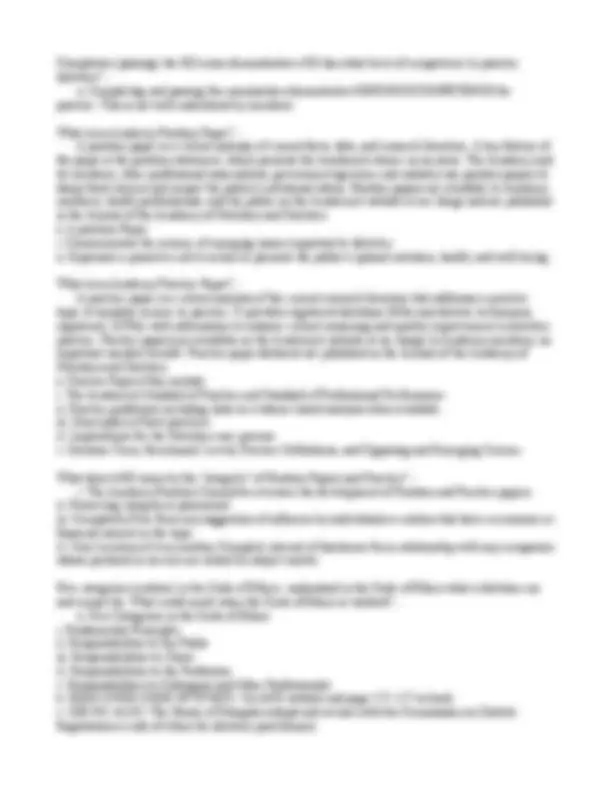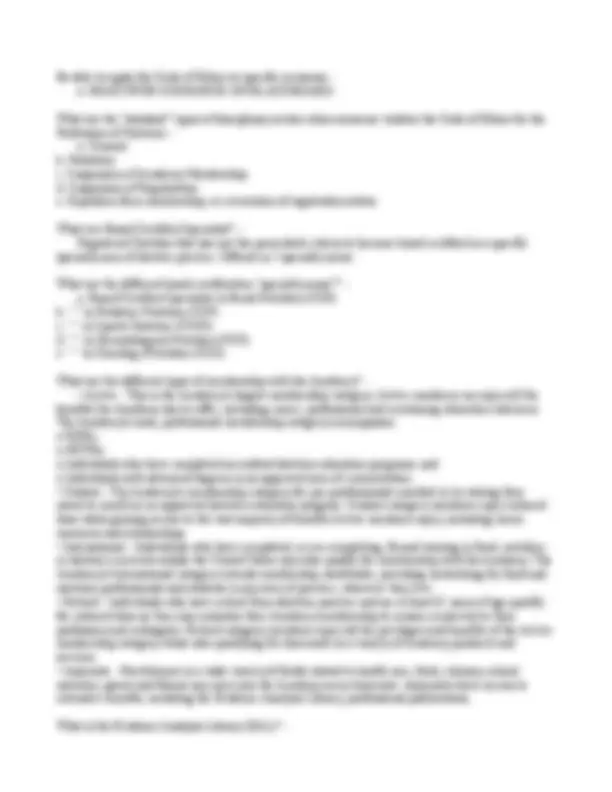





Study with the several resources on Docsity

Earn points by helping other students or get them with a premium plan


Prepare for your exams
Study with the several resources on Docsity

Earn points to download
Earn points by helping other students or get them with a premium plan
Community
Ask the community for help and clear up your study doubts
Discover the best universities in your country according to Docsity users
Free resources
Download our free guides on studying techniques, anxiety management strategies, and thesis advice from Docsity tutors
Overview of the professional development portfolio (PDP) for registered dietitians (RDs) and dietetic technicians, registered (DTRs). Outlines key components, including work samples, reflective statements, and use of the Academy of Nutrition and Dietetics' (AND) standards. Discusses the Commission on Dietetic Registration's role in the registration process, AND's code of ethics, and the evidence analysis library as a resource for evidence-based practice.
Typology: Exams
1 / 5

This page cannot be seen from the preview
Don't miss anything!




Professional Development Portfolio - coherent set of materials, including work samples and reflective statements on these samples compiled by a person to represent his or her practice as related to desired outcome. Required as part of the continuing education program for dietitians. (PDP) Academy of Nutrition Dietetics - (AND) Worlds largest organization of food and nutrition professionals. Registered Dietitian - (RD) Licensed Dietitian - (LD) required in almost all states for those providing nutrition and dietetic services. Dietetic Technician, Registered - (DTR/NDTR) Nutrition and Dietetic Technician Registered. DTRs work under the supervision of a registered dietitian nutritionists (RDNs) when in direct patient/client nutrition care in certain practice areas, and they can also work independently in other areas. Accreditation Council for Education in Nutrition and Dietetics - (ACEND) An accrediting agency for education programs preparing students to begin careers as registered dietitian nutritionists or nutrition and dietetic technicians, registered. Registration Examination - (RD Exam) (DTR Exam) Commission on Dietetics Registration - (CDR) administers RD and DTR exam, credentialing arm of the academy, responsible for all aspects of the registration process: standard setting for registration eligibility, examination development and administration, credentialing, and recertification. Position Papers - A position paper is a critical analysis of current facts, data and research literature. (also see below) Evidence Analysis Library - (EAL) The Academy of Nutrition and Dietetics Evidence Analysis Library® is a synthesis of the best, most relevant nutritional research on important dietetic practice questions housed within an accessible, online, user-friendly library. An objective and transparent methodology is used to assess food and nutrition-related science. Standards of Practice - (SOP) SOP and SOPP can be used by credentialed dietetics practitioners to assess their individual performance needs. SOP can be used in nutrition care for RDNs and DTRs describes competent levels
of practice related to direct patient care. Relate directly to patient care and are based on the four steps of the Nutrition Care Process (NCP): a. Nutrition Assessment b. Nutrition Diagnosis c. Nutrition Intervention d. Nutrition Monitoring and Evaluation Standards of Professional Performance - (SOPP) SOP and SOPP can be used by credentialed dietetics practitioners to assess their individual performance needs. SOPPs represent 6 domains of professionalism: a. Provision of Services b. Application of Research c. Communication and Application of Knowledge d. Utilization and Management of Resources e. Quality in Practice f. Competency and Accountability Code of Ethics - Enforceable code that provides for public accountability by monitoring appropriate ethical performance by a dietetics practitioner and reflects the individuals responsibility for competence in practice. Dietetic Practice Group - (DPG): A Dietetic Practice Group (DPG) may develop recognized sub-units or groups of members within the DPG based on a practice area or issue of interest to the members of the DPG. Ex: Clinical Nutrition Management DPG, Diabetes Care Education DPG. Members Interest Group - : (MIG): Member Interest Groups are groups of Academy members who have a common interest. Unlike dietetic practice groups or affiliates, member interest groups focus on areas other than the practice of dietetics or geographic location. As divisions of the national organization, MIGs reflect the many characteristics of the Academy's membership and the public it serves. Ex: Fifty Plus in Nutrition and Dietetics, Jewish Members Interest Group Continuing Professional Education Units - (CPEU): To maintain registered status, dietetics professionals must document activities by creating a Professional Development Portfolio (PDP). During each 5 year period, RDs must achieve 75 CPEUs and DTRs must complete 50 CPEUs. Based on each individuals learning needs. Registered Dietitian - (RD). a trained nutrition professional who has met the strict educational and experiential standards set forth by the Commission on Dietetic Registration (CDR) of the Academy of Nutrition and Dietetics (AND). What is scope of practice? - Scope of practice in nutrition and dietetics encompasses the range of roles, activities and regulations within which nutrition and dietetics practitioners perform.
Be able to apply the Code of Ethics to specific scenarios - a. READ OVER SCENARIOS ON BLACKBOARD. What are the "standard" types of disciplinary action when someone violates the Code of Ethics for the Profession of Dietetics - a. Censure b. Probation c. Suspension of Academy Membership d. Suspension of Registration e. Expulsion from membership, or revocation of registration status. What is a Board Certified Specialist? - Registered Dietitian that has met the prescribed criteria to become board certified in a specific specialty area of dietetic practice. Offered in 5 specialty areas: What are the different board certification "specialty areas"? - a. Board Certified Specialist in Renal Nutrition (CSR) b. " " in Pediatric Nutrition (CSP) c. " " in Sports Dietetics (CSSD) d. " " in Gerontological Nutrition (CSG) e. " " in Oncology Nutrition (CSO) What are the different types of membership with the Academy? -
a synthesis of the best, most relevant nutritional research on important dietetic practice questions housed within an accessible, online, user-friendly library. An objective and transparent methodology is used to assess food and nutrition-related science. What does evidence-based practice mean? - The use of systematically reviewed scientific evidence in making food and nutrition practice decisions by integrating best available evidence with professional expertise and client values to improve outcomes. The Academy has developed a plethora of resources to help dietetics professionals make practice decisions based on the best available scientific evidence. To become a Registered Dietitian, a person has completed these 3 major things:____, ____, and _____.